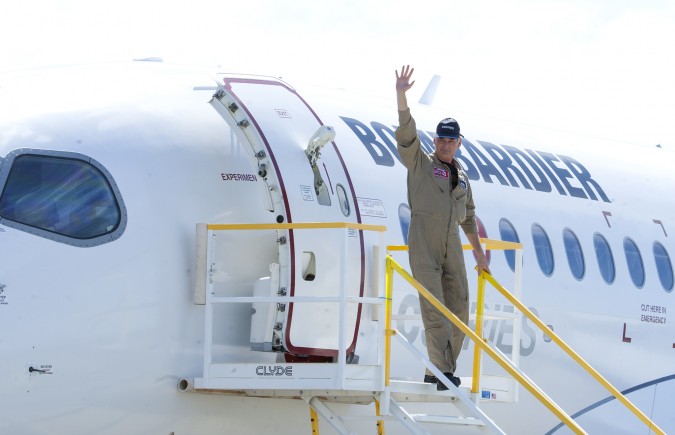MONTREAL _ Bombardier Aerospace announced plans Friday to resume test flights later this month with its CSeries commercial jetliner, nearly four months after an engine failure shut down the trials.
The date of the first flight was not disclosed, but AltaCorp Capital analyst Chris Murray said he’s heard flights could resume as early as Sunday.
Bombardier spokesman Marc Duchesne would only say that the aircraft will “definitely” fly in September.
“The aircraft is outside, things are going well, let’s be patient,” he said in an interview Friday.
Bombardier (TSX:BBD.B) has worked with engine maker Pratt & Whitney to come up with a fix for the engine’s oil lubrication system and received flight clearance from federal government authorities.
“It’s unfortunate that there was an engine incident but in a way that’s why there is a flight test program,” Duchesne added.
One test aircraft will resume flights this month and be joined later in the fall by other aircraft as they receive new engines. The aircraft that was damaged in May is being repaired and will rejoin the flight test fleet.
Rob Dewar, vice-president of the CSeries program, said the company is confident the CS100 aircraft will enter into service in the second half of next year despite the delay.
In June, Bombardier chairman Laurent Beaudoin suggested the flight tests would only be put on hold for a month following the malfunction which occurred during maintenance testing on the ground.
The much-delayed aircraft has completed 330 of 2,400 hours of flight tests required to win certification.
The company has not disclosed the cause of the May 29 engine failure that damaged a test aircraft and grounded flight testing, but it said the CSeries program has made headway in recent months by completing a series of activities including additional ground tests and software upgrades.
The delay has created some nervousness among investors and industry analysts, some of whom predicted further delays.
The CSeries program has eaten through much of its buffer to deliver the aircraft next year and there remains a potential for other problems to surface, especially when the plane flies in “normal mode” using its fly-by-wire computer system when flights resume.
Swedish company Braathens Aviation (Malmo) said last month it no longer wants to be the first recipient of the aircraft due to uncertainty surrounding the program, but did not cancel its order. In 2011, the company placed a firm order for five CS100 planes and five CS300 models, for a total of $655 million, with options for additional planes.
Analyst David Tyerman of Canaccord Genuity anticipates the aircraft won’t be delivered until 2016, but says a short delay isn’t serious.
“The only time it becomes in my mind a really big issue is if this is a two- or three-year delay,” he said in an interview.
The resumption of testing comes after the Montreal-based company created a team dedicated to the development of its business and commercial aircraft programs.
The change follows the departure of key aircraft development program leaders as part of a reorganization that will shed some 1,800 non-union employees.
Francois Caza, an employee with nearly 30 years experience, has been appointed vice-president product development and chief engineer.
The position has been carved from the newly created aerostructures division that was announced in July with the retirement of aerospace president Guy Hachey. Caza will report directly to Bombardier CEO Pierre Beaudoin, alongside the heads of business aircraft, commercial aircraft and transportation.
Tyerman anticipates the staff cuts will generate $90 million to $180 million in annual cost savings and help to improve the aerospace division’s weak margins. The company will also be helped by the lower Canadian dollar, which he estimates could raise profits by more than $260 million.
